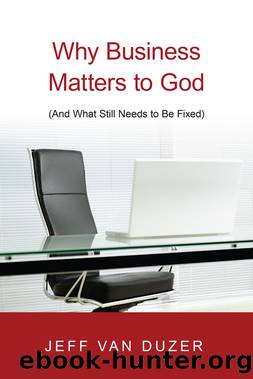Why Business Matters to God by Van Duzer Jeff;

Author:Van Duzer, Jeff; [Van Duzer, Jeff]
Language: eng
Format: epub
Publisher: InterVarsity Press
Published: 2014-05-22T00:00:00+00:00
The Niebuhr Typologies
Your friendsâ five different responses correspond to five types of Christian cultural engagement first described by H. Richard Niebuhr in his 1951 classic work, Christ and Culture.[1] After surveying the attitudes and approaches of various church leaders and authors down through history to what he characterizes as âthe enduring problem of the relation between the authorities of Christ and culture,â Niebuhr groups these responses into five types: âChrist Against Culture,â âChrist of Culture,â âChrist Above Culture,â âChrist and Culture in Paradoxâ and âChrist the Transformer of Culture.â[2]
Christ Against Culture. In our hypothetical Bible study, this is Willâs position. Get out! The world is a muddy hole of injustice and degradation. Find some clean place to stand and wait. It is not your job to try to fix it. Leave that to God.
Christ Against Culture sets the call of Christ against the call of culture. It represents a form of shouting from the outside. Because of the fallen nature of the world and its institutions Christians are to remove themselves and to decline to participate.[3] As Louke van Wensveen Siker indicates, when applied to business ethics this position is fundamentally antibusiness. Often, in less thoughtful hands, this position finds expression in a naive chastisement of businesspersons. Business is characterized as nothing more than the expression of sinful greed with resulting unjust and destructive consequences. Good Christians donât do business.
There is another prevalent and perhaps even more pernicious view that might also be included under this type. This is exemplified by the famous analogy of business to a poker game. In his well-known Harvard Business Review article, Albert Carr suggests that the practice of business can be approached like a game of cards. No one thinks less of a player at the poker table who bluffs successfully. It is all part of the game. If, on the other hand, this same person were to bluff his children, his wife or his fellow parishioners, we would be quick to accuse him of unethical behavior. His conclusion: there are separate ethics for separate spheres of life. âThe essential point, I said, is that the ethics of business are game ethics, different from the ethics of religion. . . . No one expects poker to be played on the ethical principles preached in churches.â[4]
This is a complete separation. Church on Sunday. Work on Monday. The Christianâs involvement with Godâs redemptive activity is limited to certain ethically compatible spheres of life (e.g., the church, the family, etc.), and the rough and tumble business world is simply to be taken on its own terms.
Christ of Culture. On the other hand, and at the other extreme, the Christ of Culture model finds no real tension at all between the call of Christ and the demands of the dominant culture of the day. Because of the complete alignment between the call of Christ and the call of culture, those holding this view see no need for Christians to be involved in the transformation or critique of culture. This is Emilyâs perspective.
Download
This site does not store any files on its server. We only index and link to content provided by other sites. Please contact the content providers to delete copyright contents if any and email us, we'll remove relevant links or contents immediately.
The 5 Love Languages: The Secret to Love That Lasts by Gary Chapman(9293)
The Space Between by Michelle L. Teichman(6579)
Assassin’s Fate by Robin Hobb(5859)
Wiseguy by Nicholas Pileggi(5323)
Everything Happens for a Reason by Kate Bowler(4480)
Gerald's Game by Stephen King(4380)
Pillow Thoughts by Courtney Peppernell(4022)
A Simplified Life by Emily Ley(3971)
The Power of Positive Thinking by Norman Vincent Peale(3865)
Resisting Happiness by Matthew Kelly(3197)
Girl, Wash Your Face by Rachel Hollis(3127)
Harry Potter and the Prisoner of Azkaban (Book 3) by J. K. Rowling(3117)
Being Aware of Being Aware by Rupert Spira(3087)
Real Sex by Lauren F. Winner(2869)
The Code Book by Simon Singh(2864)
More Language of Letting Go: 366 New Daily Meditations by Melody Beattie(2851)
Name Book, The: Over 10,000 Names--Their Meanings, Origins, and Spiritual Significance by Astoria Dorothy(2842)
The Holy Spirit by Billy Graham(2779)
The Secret Power of Speaking God's Word by Joyce Meyer(2755)
